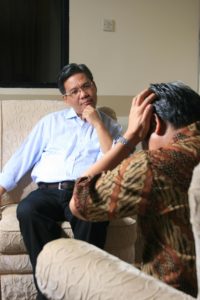Here’s some important information about spiritual counseling.
We request that all members read this post carefully.
We request that all members read this post carefully.
 In order to protect public safety, states establish licensure or certification standards for health and human services professionals. Professional counselors are required by law in every state, the District of Columbia, and Puerto Rico to be licensed in order to legally practice as a professional counselor. Licensure laws establish minimum standards in the areas of education, examination, and experience. Each state has established a board responsible for issuing licenses, …
In order to protect public safety, states establish licensure or certification standards for health and human services professionals. Professional counselors are required by law in every state, the District of Columbia, and Puerto Rico to be licensed in order to legally practice as a professional counselor. Licensure laws establish minimum standards in the areas of education, examination, and experience. Each state has established a board responsible for issuing licenses, …All statutes establishing licensure or certification requirements for counselors provide exemption from licensure for specific groups.
Commonly exempted groups:
1. Professionals licensed by other statutes
2. Students in graduate programs working under supervision
3. Members of the clergy in the performance of their religious duties in connection with a religious denomination
4. Employees of federal, state, and local agencies acting in an official capacity
5. Attorneys
(The source of previous information is the American Counseling Association)
Since Awakening Together is a legal organization, we abide by the law in how we operate. Therefore, our Sacraments of Grace policy defines spiritual counseling as a sacrament, or spiritual act, that can only be performed by an Awakening Together Ordained Minister. The Awakening Together Trustees are currently considering a proposed amendment to this policy. If approved, the amendment would permit spiritually clear guest teachers who are invited into the Sanctuary or to an Awakening Together retreat for Satsang to offer counseling as part of Satsang.
This begs the question, what is counseling? There are multiple definitions of counseling depending on the type of counseling you are referring to. However, counseling typically entails providing assistance and guidance in resolving personal, social, or psychological problems and difficulties.
Does that mean that if you aren’t an Awakening Together minister you shouldn’t advise your friends when they come to you with a problem?
That depends. Is it clear that it is friend-to-friend conversation and you have no authority as a counselor or guide, or are you perceived to have the authority to counsel? For example, if you teach in the Sanctuary and your teachings are clear, someone may perceive you as an authority and may seek you out for advice based on that perception. In that case, the advice giving could be illegal, depending on the state. You may say, “I was just helping a friend.” However, there is a test called the “assumption of responsibility” test. Here’s that test: Did you know or ought you to have known that the person to whom the advice was given would rely on that advice? If so, it is considered counseling, and if you aren’t board licensed or ordained, it’s illegal in most states.
It’s important to know that providing counseling online is even trickier if you and the person you are guiding are in two different states, because state law varies and the conversation would fall under the regulations of both states. What’s okay in one state may be illegal in the other state.
Not everyone who teaches in our Sanctuary is an Awakening Together minister, so it’s important to be clear on the difference between teaching and counseling. Counseling tends to be more personal than teaching. For example, if you ask a speaker in the Sanctuary to further explain a spiritual concept or practice that he or she teaches about, that is teaching and not counseling. If you begin to speak about a personal emotional or mental problem and seek personal advice regarding that problem, the conversation has crossed over into counseling.
Examples of teaching questions:
- How do I practice root cause inquiry, or what do I do with the feelings I’m left with after root cause inquiry?
- What is awareness-watching-awareness meditation?
- What do you mean, ‘I am not the doer’?
Examples of counseling questions:
- I think my husband is having an affair. What should I do?
- I lost my job, and I can’t pay my mortgage. I worry about the future constantly. What do you recommend I do?
- I hate myself. I eat too much. I watch too much TV. I don’t have any friends. What advice do you have to help me turn my life around?
If you are teaching in the Sanctuary and someone asks you a question that feels more like a counseling question and you aren’t ordained, let them know you aren’t able to address that question. Invite them to contact an AwakeningTogether Minister. If someone contacts you for a personal conversation that feels like a counseling session, refer that person to an Awakening Together Minister.
Churches are responsible to make sure that clergy members provide spiritual counseling according to the church’s guidelines. We teach a module on spiritual counseling in the Minister Preparation Program (MPP). In addition, beginning on March 25, 2021, we will offer a special 6-week training program for ordained ministers called